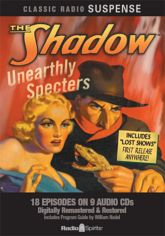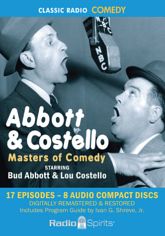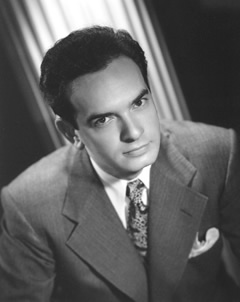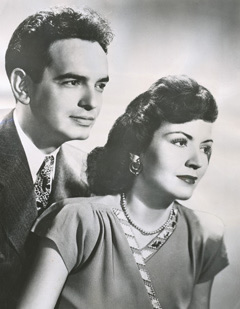


Radio Spirits presents The Shadow, in 18 digitally remastered episodes of the series eeriest exploits. You will join The Shadow, goaded by ghosts and vexed by snakes, as he battles strange and supposedly supernatural foes.

|
 ADD TO CART ADD TO CART

|


These 17 digitally restored and remastered radio episodes from the 1940s include rare never-before-released selections, and a Program Guide by Ivan G. Shreve, Jr. with photographs and background information about the show.

|
 ADD TO CART ADD TO CART

|
|
 |
|
When Radio Was Spotlight:
ELLIOTT LEWIS: Radio's Renaissance Man
by Elizabeth McLeod
Here's an exercise for the knowledgeable radio buff:
- Make a list of the most gifted serious radio actors you can bring to mind.
- Next, make a list of the funniest, most outlandish performers of comedy.
- Next, write down the most skillful radio directors.
- Finally, note the most astute radio producers.
 Now compare the lists. Chances are there will be only one name that appears on all four lists.
Now compare the lists. Chances are there will be only one name that appears on all four lists.
That name will be Elliott Lewis.
As close as radio ever produced to a Renaissance Man, Lewis could do just about anything with a microphone -- and did, especially over a ten year period spanning the mid-1940s to the mid-1950s. During that time, he was one of the most prominent figures on the creative side of broadcasting -- and one who, perhaps more than any other, kept alive the freewheeling creative spirit of 1930s experimental radio in a time when broadcasting was growing ever more governed by formula.
Elliott Lewis was a New Yorker by birth, but (unlike many of his radio contemporaries) he had little yearning for the lights of Broadway. His ambition as a young man was the law -- a pursuit that carried him to Los Angeles in the mid-1930s, where he attended Los Angeles City College and fumbled around in search of part time work to help pay his way. He hit L.A. just as West Coast radio drama was reaching its first great flowering of creativity, under the leadership of such pioneers as William N. Robson and Lindsay MacHarrie -- and there were plenty of opportunities for a bright young man with a distinctive voice. Without ever really setting out to make it a career, Lewis fell into acting in small time productions: cheap transcription serials, dramatized commercials, and bit parts on local shows. He discovered, quite by accident, that he enjoyed it tremendously, that he had an excellent voice, and that he had a larger-than-life on-air personality!
By the end of the decade, Lewis had jumped into network radio, as one of the many hard-working character actors whom directors kept at the front of their file boxes, knowing that they could be depended upon for a first class performance on short notice. Lewis specialized in brash wiseguy characterizations on comedy programs, and was soon appearing in support of top Hollywood comics like Jack Benny, Al Jolson, and Burns & Allen. By 1940, he could boast nearly two dozen different roles in the space of a typical week. He was earning a good living doing work he really came to love...until the war intervened.
Lewis rose to the rank of Master Sergeant in the U. S. Army, but he didn't end up just another dogface slogging through the European mud. The Armed Forces Radio Service had other plans for Sergeant Lewis, posting him at AFRS headquarters alongside another bright young man in khaki by the name of Howard Duff, where together they oversaw the production of dozens of original programs. The work was fast-paced, the assignments went in one door and out the other with breathtaking speed. There was little time for creativity, but in this pressure-cooker environment, Lewis learned everything there was to know about the nuts and bolts of assembling a radio program -- from selecting a script to working with talent, from structuring the broadcast to signing off on the paperwork when the job was done. Many men emerged from stateside Army duty four years older and little else, but Elliott Lewis had gained the equivalent of a university degree in radio production. He also gained a wife, radio actress Cathy Lewis, who he married during a 1944 furlough, and who shared his zeal for the creative side of broadcasting. When the war came to its conclusion, the Lewises were ready and eager to make their mark.
 The next two years found Elliott Lewis defining his postwar radio persona in two memorable roles -- roles that couldn't possibly be more different. In 1946, he was cast as the shiftless, loutish, alcoholic guitar player Frankie Remley, in support of Phil Harris and Alice Faye -- one of the most outrageous comedy characters radio had ever heard. Lewis savored the barbarousness of the role, emphasizing every disreputable trait in the character, and gave every line an extra punch that brought explosive laughter.
The next two years found Elliott Lewis defining his postwar radio persona in two memorable roles -- roles that couldn't possibly be more different. In 1946, he was cast as the shiftless, loutish, alcoholic guitar player Frankie Remley, in support of Phil Harris and Alice Faye -- one of the most outrageous comedy characters radio had ever heard. Lewis savored the barbarousness of the role, emphasizing every disreputable trait in the character, and gave every line an extra punch that brought explosive laughter.
And in 1947, Lewis went in just the opposite direction -- taking the role of a serious-minded, responsible, hard-nosed sea captain. Captain Philip Carney, of Voyage of the Scarlet Queen, was a man who took exotic adventure as a matter of course
and that course carried him to some of the world's most colorful corners. A series like this could easily have devolved into pointless pirate-of-the-week blood and thunder, but the scripts by Gil Doud and Robert Tallman gave Lewis exactly what he needed to bring Philip Carney to realistic, fully-detailed life. It also gave him a taste for adult-oriented adventure programming -- a format he'd remain associated with for the rest of his career. While Voyage Of The Scarlet Queen lasted only a single season, it helped establish a new, more mature direction for radio drama, and Elliott Lewis would figure significantly in the development of that trend.
Lewis also had a hand in another important trailblazer in the movement toward adult adventure programs. Simultaneous with his appearance in Scarlet Queen, Lewis played the lead role in a pioneering adult western. Originally titled Hawk Durango and later changed to Hawk Larabee, the program was one of the earliest continuing-character western dramas to paint its characters in shades of grey, moving beyond the lawman versus bad man oaters that had long been stereotyped as kiddie fare. Like Scarlet Queen, the series had a touch of the anthology -- where Captain Carney traveled the world encountering new adventures every week, Hawk Durango/Larabee, as the proprietor of a frontier hotel, had new adventures come to him. Lewis alternated with Barton Yarborough in the title role, and working under producer William N. Robson gave him further training from one of radio's great creative masters.
These three roles would establish Lewis as more than just another character actor, and his experience during the war gave him entree to the executive offices as well. When the call went out for a new producer/director for CBS's venerable Suspense series in 1950, Lewis grabbed the opportunity -- and his years at the helm of that program stand as his creative peak. Lewis let his creativity run rampant, with startling casting choices, provocative scripts, and deeply-textured productions that took the long-running program to new heights of achievement.
His success on Suspense -- and the critical acclaim it gathered -- convinced the network to give him additional programs. By 1953, he helmed two other impressive anthologies -- On Stage, in which he co-starred with his wife Cathy Lewis, and Crime Classics, which did for crime drama what he had already done for Suspense. That year he was the subject of a laudatory profile in Time magazine, in which he confessed his ultimate goal was to have a different program on the air five nights out of every week.
But it wasn't to be. Elliott Lewis's success had come at the very end of radio's life as an important creative medium. By the mid-1950s, television had penetrated every state -- and radio was facing abandonment. Lewis reluctantly moved into TV, but never achieved the success there that he'd known at the microphone. When Elliott and Cathy Lewis divorced in 1958, it marked more than the end of a marriage -- it was the end of an era as well.
Elliott Lewis worked on through the 1960s, mostly in television, but dabbled in films as well. In the 1970s, a nostalgia craze revived interest in radio drama -- and Elliott Lewis jumped at the chance to return to the medium he'd loved. In 1973, he directed Rod Serling's Zero Hour, a Suspense-type anthology. And, in 1979, Sears, Roebuck and Company gave him a five-a-week time slot, and carte blanche to fill it as he saw fit within a one-hour dramatic format. The Sears Radio Theatre wasn't quite the level of creative achievement of twenty-five years before, but it was radio, real radio once again. And Elliott Lewis finally achieved his goal -- on the air with an original drama five nights a week.
Elliott Lewis died in 1990, about a decade after his final radio work. And, that body of work remains as an enduring monument to one of the medium's true masters.
©2011 Radio Spirits and Elizabeth McLeod. All rights reserved.
|
|
 |
|